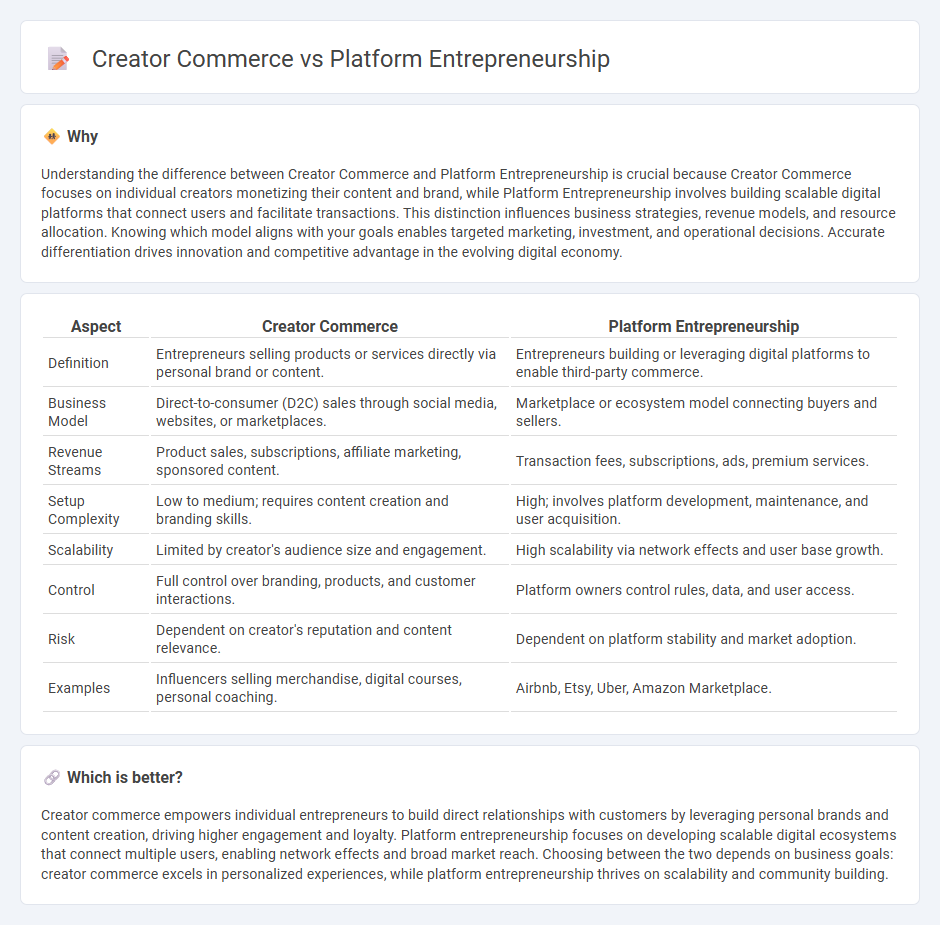
Creator commerce leverages individual content creators who build personal brands to market and sell products directly to their audience, utilizing social media and e-commerce tools for tailored customer engagement. Platform entrepreneurship focuses on developing scalable digital infrastructures that connect buyers and sellers or service providers within a broad ecosystem, generating network effects and diverse revenue streams. Explore how both models redefine business dynamics and unlock new opportunities in the digital economy.
Why it is important
Understanding the difference between Creator Commerce and Platform Entrepreneurship is crucial because Creator Commerce focuses on individual creators monetizing their content and brand, while Platform Entrepreneurship involves building scalable digital platforms that connect users and facilitate transactions. This distinction influences business strategies, revenue models, and resource allocation. Knowing which model aligns with your goals enables targeted marketing, investment, and operational decisions. Accurate differentiation drives innovation and competitive advantage in the evolving digital economy.
Comparison Table
| Aspect | Creator Commerce | Platform Entrepreneurship |
|---|---|---|
| Definition | Entrepreneurs selling products or services directly via personal brand or content. | Entrepreneurs building or leveraging digital platforms to enable third-party commerce. |
| Business Model | Direct-to-consumer (D2C) sales through social media, websites, or marketplaces. | Marketplace or ecosystem model connecting buyers and sellers. |
| Revenue Streams | Product sales, subscriptions, affiliate marketing, sponsored content. | Transaction fees, subscriptions, ads, premium services. |
| Setup Complexity | Low to medium; requires content creation and branding skills. | High; involves platform development, maintenance, and user acquisition. |
| Scalability | Limited by creator's audience size and engagement. | High scalability via network effects and user base growth. |
| Control | Full control over branding, products, and customer interactions. | Platform owners control rules, data, and user access. |
| Risk | Dependent on creator's reputation and content relevance. | Dependent on platform stability and market adoption. |
| Examples | Influencers selling merchandise, digital courses, personal coaching. | Airbnb, Etsy, Uber, Amazon Marketplace. |
Which is better?
Creator commerce empowers individual entrepreneurs to build direct relationships with customers by leveraging personal brands and content creation, driving higher engagement and loyalty. Platform entrepreneurship focuses on developing scalable digital ecosystems that connect multiple users, enabling network effects and broad market reach. Choosing between the two depends on business goals: creator commerce excels in personalized experiences, while platform entrepreneurship thrives on scalability and community building.
Connection
Creator commerce leverages individual content creators to sell products directly to their audience, while platform entrepreneurship builds and manages digital ecosystems that enable such commerce activities. The success of creator commerce relies heavily on platform entrepreneurship because platforms provide the technological infrastructure, marketplaces, and tools needed for creators to monetize their influence effectively. By integrating seamless payment systems, marketing analytics, and community engagement features, platform entrepreneurs empower creators to scale their businesses and innovate within the digital economy.
Key Terms
Platform entrepreneurship:
Platform entrepreneurship leverages digital infrastructures to connect multiple user groups, fostering ecosystems where value is co-created through network effects. Entrepreneurs build scalable platforms that facilitate interactions between producers, consumers, and third-party developers, driving innovation and market expansion. Explore how platform-based business models can revolutionize market dynamics and unlock new growth opportunities.
Multi-sided marketplace
Platform entrepreneurship thrives on building multi-sided marketplaces that connect diverse user groups, such as buyers, sellers, and service providers, facilitating seamless transactions and network effects. Creator commerce focuses on empowering individual content creators to monetize their audiences directly through marketplaces tailored for digital goods, services, and experiences, often leveraging social media and influencer networks. Explore the distinct dynamics and opportunities in multi-sided marketplaces within platform entrepreneurship and creator commerce to optimize business growth.
Network effects
Platform entrepreneurship harnesses network effects by enabling multiple users to interact, creating value as more participants join, such as drivers and riders on Uber. Creator commerce relies on network effects through personalized communities where creators engage followers, driving sales and brand loyalty, exemplified by influencer-driven marketplaces like Patreon. Explore how network effects uniquely empower platform entrepreneurs and creator-commerce leaders to scale impactful ecosystems.
Source and External Links
Launching a Platform Business: 5 Steps for Entrepreneurs - Platform entrepreneurship involves creating value by addressing customer needs, choosing a business model, attracting users, building technology, and scaling, with a key focus on trust-building mechanisms in the platform to facilitate exchanges among users.
Platform Business Model - Definition | What is it ... - Platform entrepreneurship is based on a business model that creates value by facilitating exchanges between two or more interdependent groups, typically consumers and producers, using scalable networks and network effects rather than owning production.
Platform-Dependent Entrepreneurs: Power Asymmetries, ... - Platform entrepreneurship refers to entrepreneurs or organizations building businesses dependent on digital platforms like Amazon, Etsy, or Facebook, where conditions differ from traditional business models and involve leveraging platform ecosystems to access large markets.
 dowidth.com
dowidth.com